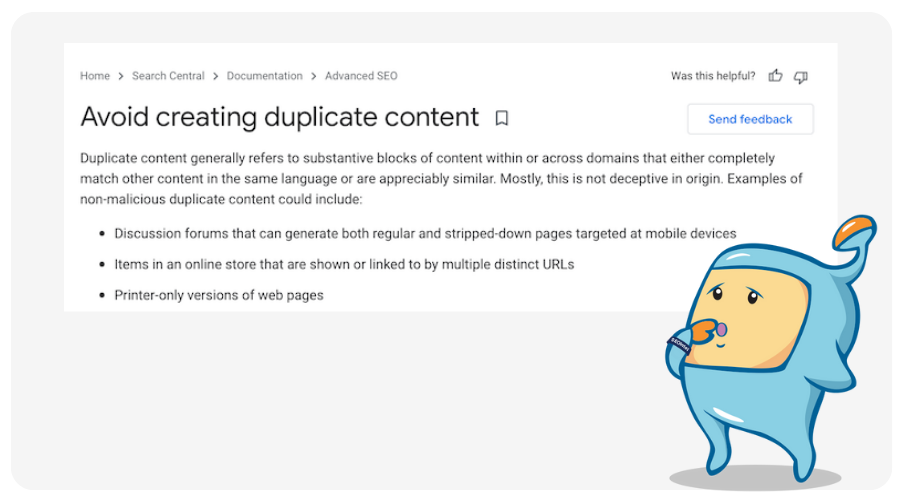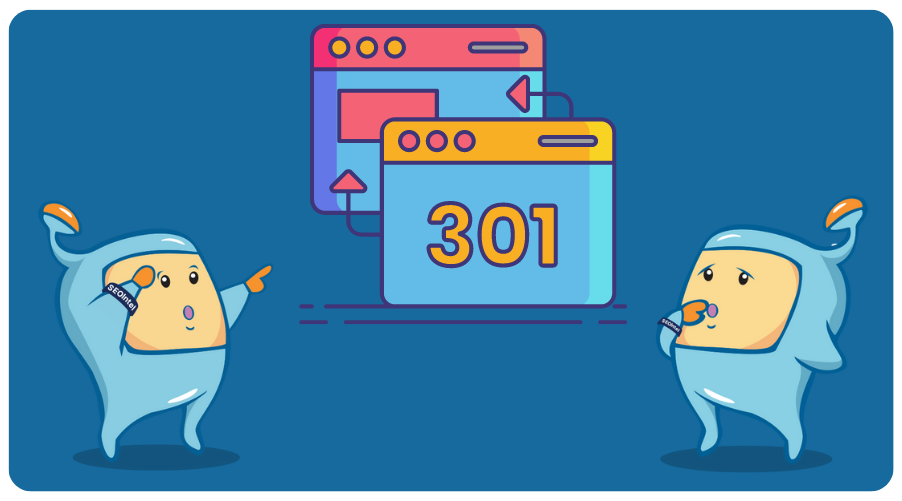Are you familiar with the concept of duplicate content in SEO?
You might have come across horror stories about search engines like Google penalizing websites for duplicating even a single title or phrase.
That's not entirely true.
In reality, most of the people who spread these rumors have little to no understanding of what duplicate content truly means and how it genuinely impacts your SEO.
Below, you will be guided through a clear explanation of what duplicate content is and its actual effects on search rankings.
Along the way, I'll also debunk some common misconceptions.
Here is what you will learn in this article:
Duplicate content refers to content that is an exact replica of the content found on another page. It involves content that exists in more than one location or URL on the internet.
Essentially, if the same information is available on multiple URLs, it can be considered duplicate content.
However, "Duplicate Content" also encompasses content that is similar to other content, even if it has been slightly reworded.
According to a study by Raven, up to 29 percent of pages contain duplicated content.
But what exactly falls under the category of duplicate content?
Does it apply only to complete webpages, or can it include a few lines of text?
Well, let's turn to Google's definition of duplicate content:

According to Google, duplicate content can refer to anything ranging from a product description to an entire webpage if it appears in various locations on your website.
Duplicate content can have significant implications for a website's search engine optimization (SEO) efforts.
While search engines like Google strive to provide users with unique and relevant search results, they typically do not want to rank pages with duplicate content. Understanding the impact of duplicate content on SEO is crucial for website owners and marketers.
Let's explore the three main ways duplicate content can affect SEO.
When multiple pages on a website contain duplicate content, search engines face the challenge of determining which page is the most relevant and should be ranked.
As a result, the search engine may choose to display only one version of the content or rank the pages lower in search results. This can lead to a decrease in organic traffic to those pages.
For example, imagine a website that has three pages with similar content. If search engines cannot identify the original or most relevant page, all three pages may struggle to rank well.
Consequently, the website will experience reduced visibility and fewer clicks from organic search results, resulting in a decline in organic traffic.

In rare cases, websites that engage in malicious practices such as content scraping or copying content from other sites without permission may face penalties from search engines.
Google, for instance, has the authority to penalize or even deindex websites that engage in such activities.
It is crucial to note that receiving a duplicate content penalty is extremely rare and typically reserved for deliberate and malicious actions. For most websites that inadvertently have duplicate content issues, there is no need to worry about incurring a penalty.
When a website contains a significant amount of duplicate content, search engines may decide not to index some or all of those duplicate pages. This means that those pages will not appear in search engine results and will not contribute to organic traffic.
For larger websites, such as e-commerce sites with numerous product variations or search result pages, the presence of duplicate content can lead to a waste of crawl budget.
Search engines have limited resources for crawling and indexing web pages. If a substantial portion of a website's crawl budget is spent on duplicate content, fewer pages may be indexed, and the website's overall visibility and organic traffic may be compromised.
It is important to keep the number of indexed pages aligned with the actual unique content on the website. By eliminating or consolidating duplicate content, website owners can ensure that search engines focus on indexing and ranking the most valuable and relevant pages.
By doing so, they can enhance their website's visibility, improve rankings, and attract more organic traffic.
To address and prevent issues related to duplicate content, it is essential to follow these best practices:
One common cause of duplicate content is when the same content is accessible through different URLs. It is important to ensure that different variations or versions of content are consolidated onto a single URL to avoid duplications.
Regularly check the number of indexed pages on your website using tools like Google Search Console or by performing a site:example.com search in Google.
Ensure that the number of indexed pages aligns with the intended number of unique pages on your site, and be cautious of any unexpected increases that may indicate duplicate content issues.
Ensure that your website is properly configured to redirect different versions or variations of the same content to a preferred version. This includes redirecting non-www URLs to www URLs or HTTP URLs to HTTPS URLs, ensuring all versions lead to a single canonical URL.

Implement 301 redirects to permanently redirect duplicate content pages to the original or preferred version. This helps search engines understand which version should be indexed and avoids splitting the page's ranking potential across multiple duplicates.
While duplicate content is typically associated with exact matches, it's important to be aware of similar content as well. Even slight variations or rewrites can still be considered duplicate content. Strive to create unique and valuable content for each page to avoid potential issues.
Utilize the rel=canonical tag to indicate the preferred or original version of a page when similar or duplicate versions exist. The canonical tag helps search engines understand the primary source of content and can consolidate ranking signals to the preferred version.
Take advantage of SEO tools that can help identify and analyze duplicate content issues on your website. Tools like Siteliner can scan your site for duplicate content and provide insights for resolving those issues.
If you have multiple pages with similar content, consider consolidating them into a single page. By combining related content into one comprehensive and unique page, you can eliminate duplicate content and improve the overall quality and relevancy of the page.
If you are using a WordPress website, be mindful of the automatically generated tag and category pages. These pages can often lead to significant duplicate content problems.
To prevent search engines from indexing these pages, you can add the "noindex" tag, ensuring they exist without being included in search engine results.
Duplicate content can have detrimental effects on a website's SEO performance. It can lead to reduced organic traffic, potential penalties from search engines, and fewer indexed pages.
To address duplicate content issues effectively, it is important to implement best practices such as consolidating similar content, using proper redirects, employing canonical tags, and monitoring indexed pages.
By prioritizing unique and valuable content, website owners can improve their SEO rankings and provide a better user experience.